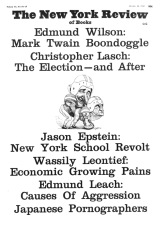In response to:
Two Cheers for the University from the August 22, 1968 issue
To the Editors:
It is not clear to me that item 7 (3) of Charte de Nanterre which Lawrence Stone quotes (NYR, August 22) necessarily rejects numerical restrictions on admissions to the University. It is true that repudiation of concern for “the long-or short-term needs of the economy” would fit in nicely with such a rejection; but in principle, a selective process not based on “social divisions” could be ruthlessly restrictive—on meritocratic or other lines—in numerical terms.
J. C. Maxwell
Balliol College
Oxford
Lawrence Stone replies:
Mr. Maxwell is correct to point out that the article 7 (3) of the Charte de Nanterre does not expressly and specifically reject a selection process for University admission, but merely one “based on social divisions and on the long-or short-term needs of the economy.” On the other hand, any selection system must operate as (1) a meritocracy, by raising entrance requirements; but articles 7 (2) and (3) point out (with considerable. justification) that a meritocracy favors candidates from middle-class homes;
(2) a frankly class-oriented system which deliberately arranges its intake to favor sons of the rich rather than sons of the poor—like Oxbridge or the Ivy League before the War—or sons of the poor rather than sons of the rich—like some Communist countries today. French student organizations have hitherto obstinately refused all suggestions of any kind of restriction on admission, despite the appalling overcrowding at the Universities, and the shortage of suitable jobs thereafter. In the light of this refusal, I do not see what construction can be put on articles 7 (2) and (3) other than that I gave to them.
This Issue
October 10, 1968



